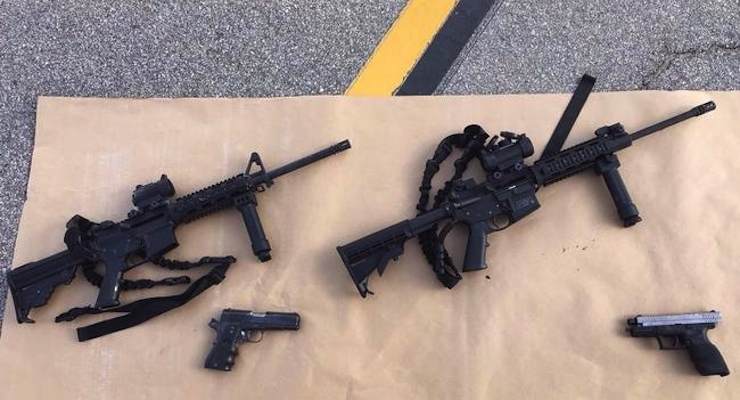

The weapons used in the San Bernardino attack. (Photo: Courtesy of San Bernardino PD)
A federal class action lawsuit was filed in Rochester, New York, against the Justice Department for cross-checking potential gun-buyers with the terror watch list. Paloma Capanna, an attorney, filed the lawsuit on behalf of more than two dozen individuals led by Larry Pratt, executive director of Gun Owners of America.
Ms. Capanna, a policy analyst with the New York-based gun rights group Shooters Committee on Political Education, took aim in his brief at the Terrorist Screening Database maintained by the Terrorist Screening Center, a division of the Federal Bureau of Investigation (FBI). The proposal was raised by the White House in the wake of the San Bernardino terrorist attacks, but allegedly was already put into practiced to some degree in February 2004. However, Ms. Capanna says the policy not only tramples on the “innocent until proven guilty” principle but also would not have prevented the California attack.
“The federal government has enacted nine specific categories of persons, who, through their actions and omissions and after a rigorous legal course, can be deemed to have forfeited their privileges under the Second Amendment of the United States Constitution. Being a named person on a ‘terrorist watch list’ is not a federal statutory disqualifying factor, nor should it be,” Ms. Capanna said in the complaint.
The complaint also underscored how the late Sen. Edward M. Kennedy, D-Mass., was erroneously added to the federal “no-fly” list, as well as conservative journalist Stephen F. Hayes. There is virtually no recourse to appeal these placements and can take months if not years to be removed. Essentially, there is no due process for those alleged to have terror ties or those who simply have similiar names to others who should be.
The Justice Department has yet to respond to a request for comment, but the plaintiffs asked the federal judge in the Western District of New York to issue an injunction barring federal authorities from cross-checking the National Instant Criminal Background Check used during gun purchases with the terrorist databases. They argued that the policy violates constitutional rights to bear arms, to be free improper searches and seizures, and to due process.
“Permanent deprivation of a fundamental civil right cannot and should not occur because something as small as an alleged, anonymous tip places an individual in a secret database managed by the attorney general, the FBI, and/or the TSC to which the individual has no right of access and no method of recourse,” the complaint continued.







